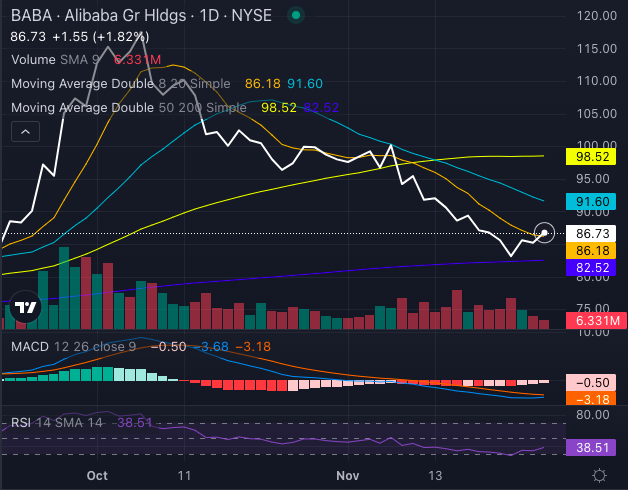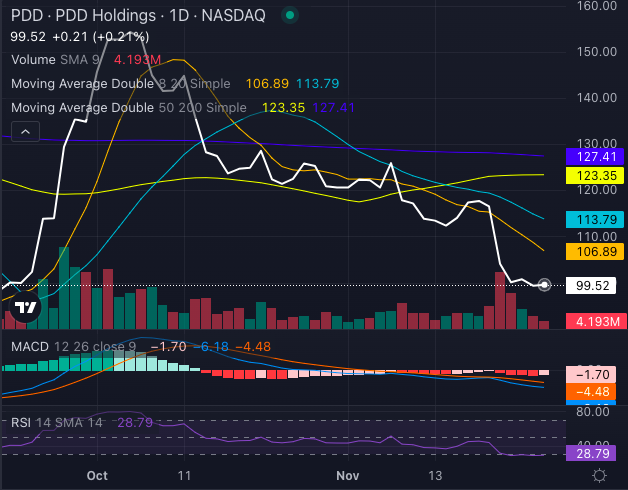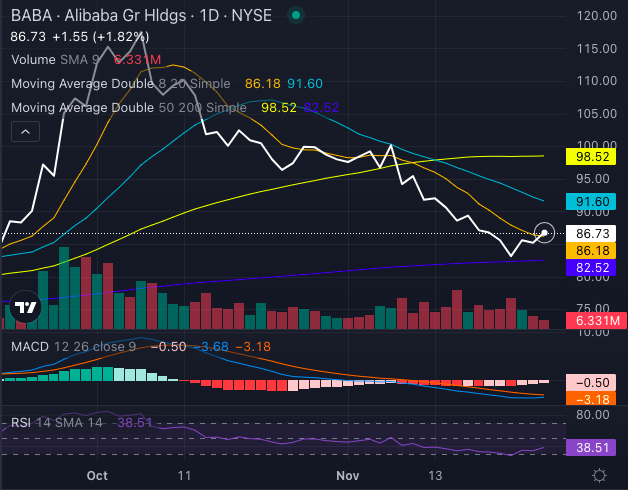Alibaba and PDD Holdings Face Rough Times in E-Commerce
Once at the forefront of China’s e-commerce scene, Alibaba Group Holding Ltd BABA BABAF and PDD Holdings Inc PDD now grapple with disappointing market performance.
Let’s explore the stories behind these stocks, which seem to be vying for the title of ‘most bearish trend.’
Alibaba: An Underperforming Giant?
Currently trading at $86.73, Alibaba’s stock displays a mix of resilience and vulnerability. The stock has increased by 12.12% over the past year but has recently plummeted by 13.01% in the last month.

Chart created using Benzinga Pro
From a technical perspective, Alibaba’s stock appears bearish as it trades below crucial moving averages, including the 20-day and 50-day simple moving averages (SMAs). The eight-day SMA sits at $86.18 and the 200-day SMA at $82.52, hinting at a possible reversal as the stock approaches an oversold relative strength index (RSI) of 38.51.
Although investor confidence remains low, prominent firms like Soros Capital Management and Bridgewater Associates continue to accumulate shares. Is Alibaba a contrarian’s dream?
Perhaps, but its potential recovery could be hindered by new U.S. tariffs.
Read Also: Alibaba Reshapes E-Commerce Operations, Names Jiang Fan as Unit CEO
PDD Holdings: From High Flyer to Free Fall
PDD Holdings presents a bleaker narrative. After achieving impressive growth with Temu in the U.S., the company now endures a swift sell-off.
The stock has dropped 33.22% over the last six months, with a 20.52% decline occurring within just a month—all signs that investors are questioning Temu’s discount-driven approach.

Chart created using Benzinga Pro
Technical signs are troubling for PDD, with a MACD reflecting a negative 6.18 and an RSI of 28.79 indicating oversold conditions.
Even though institutions like Fisher Asset Management have increased their investments, analysts are becoming cautious. JPMorgan has downgraded PDD to neutral and reduced its price target to $105, while Benchmark lowered its target to $160 from $185.
Additionally, concerns about regulatory risks tied to Temu continue to fuel negative market sentiment.
The Bottom Line: Weighing Risks and Opportunities
While both companies face significant challenges, PDD’s sharper declines highlight its riskier outlook. Alibaba, with its broader range of revenue sources and less severe drop, may appeal more to risk-tolerant investors.
Nevertheless, the looming threat of tariffs suggests both stocks might experience further challenges. For the time being, it’s about determining who is faring a little better—not an encouraging prospect for either.
Read Next:
Market News and Data brought to you by Benzinga APIs








